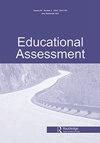The Practice of Formative Assessment in Ethiopian Secondary School Curriculum Implementation: The Case of West Arsi Zone Secondary Schools
IF 2.3
Q1 EDUCATION & EDUCATIONAL RESEARCH
引用次数: 9
Abstract
ABSTRACT The purpose of this paper is to examine the practices of formative assessment in the West Arsi zone secondary schools in Ethiopia. A descriptive cross-sectional survey research design was employed. The study participants were secondary school supervisors, principals, teachers, and students. Questionnaires, interviews, observations, and document analysis were used to gather data. The results revealed that secondary school teachers sometimes communicate learning objectives for students, sometimes integrate formative assessment strategies, and sometimes provide formative feedback, with considerable variation of practices. The results have further shown that lack of instructional materials, absence of laboratory equipment and/or technicians, lack of teachers’ competencies, large class size, and shortage of instructional time were the major challenges to formative assessment implementation.形成性评价在埃塞俄比亚中学课程实施中的实践:以西阿尔西地区中学为例
摘要本文旨在考察埃塞俄比亚西阿尔西地区中学的形成性评估实践。采用描述性横断面调查研究设计。研究参与者包括中学督学、校长、教师和学生。问卷、访谈、观察和文件分析用于收集数据。研究结果表明,中学教师有时会向学生传达学习目标,有时会整合形成性评估策略,有时会提供形成性反馈,做法也有很大的差异。研究结果进一步表明,缺乏教学材料、缺乏实验室设备和/或技术人员、缺乏教师能力、班级规模大和教学时间短是实施形成性评估的主要挑战。
本文章由计算机程序翻译,如有差异,请以英文原文为准。
求助全文
约1分钟内获得全文
求助全文
来源期刊

Educational Assessment
EDUCATION & EDUCATIONAL RESEARCH-
CiteScore
3.20
自引率
6.70%
发文量
24
期刊介绍:
Educational Assessment publishes original research and scholarship on the assessment of individuals, groups, and programs in educational settings. It includes theory, methodological approaches and empirical research in the appraisal of the learning and achievement of students and teachers, young children and adults, and novices and experts. The journal reports on current large-scale testing practices, discusses alternative approaches, presents scholarship on classroom assessment practices and includes assessment topics debated at the national level. It welcomes both conceptual and empirical pieces and encourages articles that provide a strong bridge between theory and/or empirical research and the implications for educational policy and/or practice.
 求助内容:
求助内容: 应助结果提醒方式:
应助结果提醒方式:


